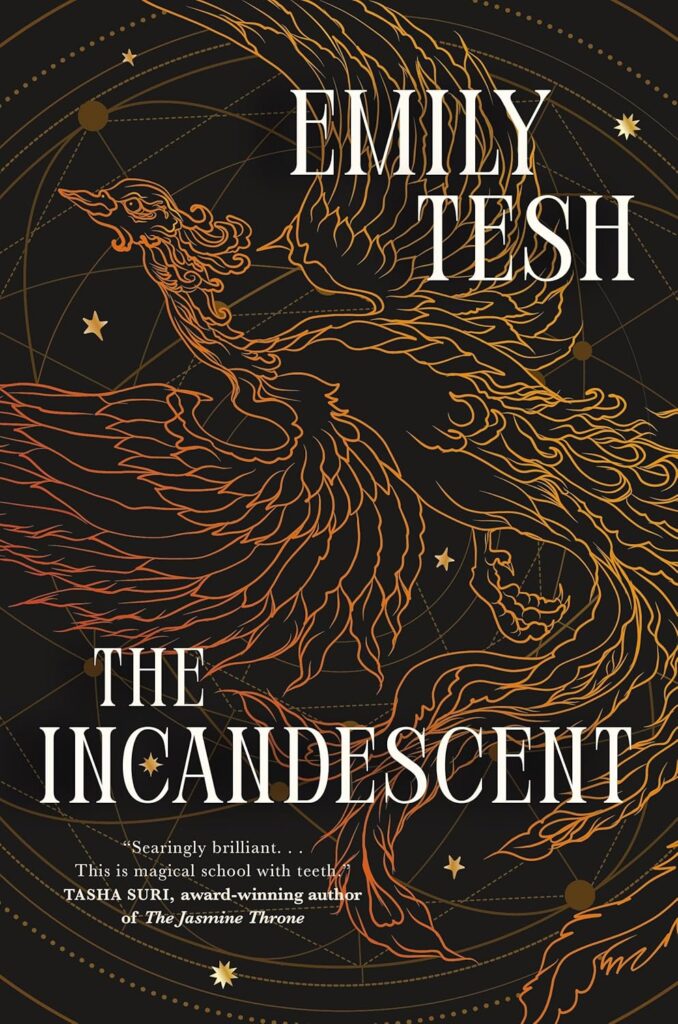Review: The Incandescent by Emily Tesh
Emily Tesh is the author of Some Desperate Glory, the debut novel (it was preceded by two novellas) that won the Hugo award last year. It’s an absolutely top-notch space opera that races through a trilogy’s worth of plot in a single volume, ruthlessly overturns the conventions of the YA adventure, and has some smart things to say about how fascism is inculcated in the young, and what it takes for them to break out of it. I would have been agog for for Tesh’s follow-up novel just on the strength of this calling card, but I became even more eager to read it when I learned its topic: a magical school story, as told from the perspective of the teacher. Strange Horizons were kind enough to let me review it.
Saffy Walden is Director of Magic at Chetwood School, “founded as a school of pure magic, turning out fully trained magicians who were masters of all the arcane disciplines […] and, as a bonus, could usually add, subtract, and write their own names.” But that was in the past, she immediately tells us, “before the advent of the National Curriculum and OFSTED’s private-sector shadow, the Independent Schools Inspectorate. These days Chetwood School was a specialist foundation, like a technical or musical college, with a full complement of academic teaching staff alongside the magicians.”
Right away, then, Tesh sets up the duality that the rest of the novel will play with. There is magic, the arcane discipline that promises immense power but carries tremendous risk—indeed, Saffy is introduced filling out a risk assessment form for an upcoming practical lesson that includes boxes for demonic possession and the incursion of another plane of reality onto our own. But there is also magic, the specialization that can set you apart in an Oxbridge interview; that, like Classics, is perhaps more useful as a marker of class and privilege than an actual discipline. As Director of Magic, Saffy is in charge of monitoring the defenses that hold back creatures from the demonic plane, for whom a gathering of hundreds of magically gifted youngsters represents an irresistible snack (this conceit echoes Naomi Novik’s Scholomance trilogy [2020-2022], a setting in which teachers were pointedly and deliberately absent). But she also spends her time in budget meetings, or advising her A-level students as they prepare to apply to university.
A teacher herself, Tesh fills the novel with granular, lived-in details of the teaching experience that stress not just its challenges, but the scope it offers for creativity and self-expression. A standout scene sees Saffy auditing a GCSE seminar, highlighting the delicate, skilled way in which the teacher leading the discussion manages to direct it in certain avenues while leaving students the freedom to develop their own ideas. Much of Saffy’s work involves negotiating her students’ fluid, in-between states: recognizing when they need to be treated like children, and when to be respected like adults. There is a tremendous fondness towards young people running through this book which feels like both an extension of, and a response to, the way that much of YA fantasy treats one’s sixteenth and seventeenth years as the sole defining moments of a life. Yes, these are near-adults making impactful decisions, Tesh and Saffy seem to be saying. But they are also young, inexperienced people, who deserve a space in which they can experiment, make mistakes, and change their minds.
There’s plenty of fantasy in The Incandescent. But there are also some pretty smart and disquieting observations on how education and class dovetail in modern society (modern British society in this novel, but many of the inequalities it notes feel universal). I found myself thinking about it while watching the second episode of Netflix’s Adolescence, which takes place in a fairly average, but extremely depressing, public school, where teachers are overworked and checked out, and kids have zero faith that the system cares about them or will be able to protect them. It was hard not to feel that the kids in Tesh’s novel, exposed as they are to the occasional danger of being eaten by demons, are still better off than the ons in the show. That is, I’m fairly certain, something that Tesh wants you to come away from The Incandescent thinking about.



